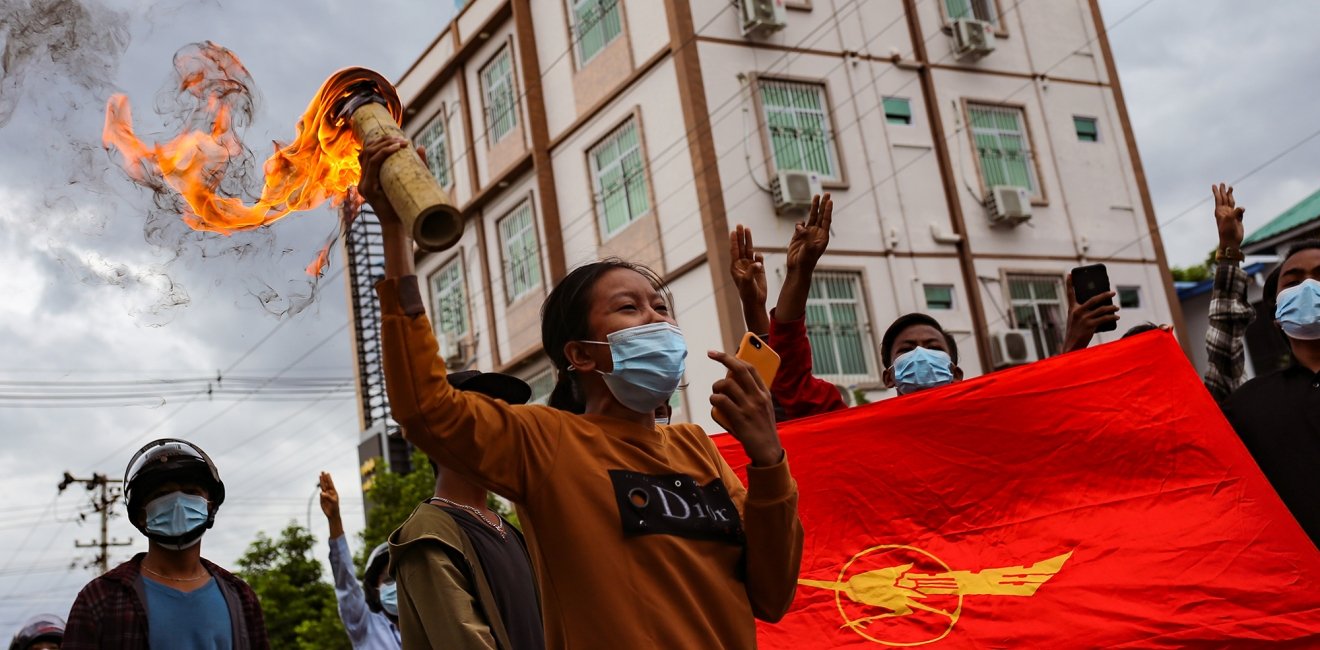
A blog of the Indo-Pacific Program
The Biden administration has a full plate of major foreign policy challenges — from Ukraine to North Korea to Iran. But this crowded agenda must leave room for still another consequential issue — the gathering civil war in Myanmar on what is now the first anniversary of the military coup that ignited that conflict.
Myanmar, or Burma, gained independence from British rule in 1948 as a parliamentary democracy. Within a few years, however, the army (the Tatmadaw) seized power and installed a junta that ruled the country in various guises for nearly fifty years. The Tatmadaw proved to be both economically and politically incompetent — producing pervasive poverty in a naturally wealthy country and generating deep animosity within the overall civilian population. Occasional uprisings against military rule were ruthlessly suppressed. In 1988 and 2007, the army turned its weapons on student demonstrators and saffron-clad monks — killing large numbers of both. All of this generated international condemnation, led by Europe and the United States, along with sanctions on foreign aid and military sales. The junta responded by putting the leader of the opposition, Aung San Suu Kyi, under house arrest and turning to China for economic, military, and diplomatic support.
Finally, in 2010, the accumulated international and domestic pressures produced a political breakthrough. The Tatmadaw released Suu Kyi and permitted elections under a new constitution that preserved an Armed Forces veto over major policy changes while keeping the Tatmadaw in charge of the Defense and Internal Security ministries. The result was a dramatic tableau of light and shadow. Suddenly there was a free press, real educational opportunities, foreign investment, international travel, internet availability, small businesses everywhere, and a vibrant political/social life. At the same time, the army continued its long conflict with ethnic minorities — including a particularly ugly and brutal campaign of ethnic cleansing against a Muslim minority, the Rohingya.
For outside observers, this was evidence of a healthy embrace of civilian-led democracy. For the Tatmadaw, however, it was an affront and a threat.
Meanwhile, every election produced a decisive victory for Aung San Suu Kyi’s party, the National League for Democracy, over the party representing the Tatmadaw. For outside observers, this was evidence of a healthy embrace of civilian-led democracy. For the Tatmadaw, however, it was an affront and a threat. So, without warning, on February 1, 2021, the leader of the Tatmadaw, Gen. Min Aung Hlaing, conducted another coup. Aung San Suu Kyi was imprisoned, parliament dissolved, and martial law declared. Myanmar had been down this road before — but this time something remarkable happened — something the Tatmadaw clearly did not expect.
Instead of being cowed into submission, or even welcoming the coup, huge numbers of people in cities, towns and villages across the country went into the streets to demand the restoration of democracy. Civil servants quit their jobs, banks and schools closed, railway workers left — all part of a mass “civil disobedience movement.” The Tatmadaw reacted with brute force — bullets instead of tear gas. Thousands were arrested, many were imprisoned and tortured. Instead of being frightened into submission, deep popular anger at the military has morphed into a growing armed resistance. This is the story of bureaucrats, bank tellers and school teachers going into the jungle to join a burgeoning Peoples Defense Force (PDF). PDF units are often linked with existing ethnic minority “armies” that have been fighting the Tatmadaw for decades seeking local autonomy and self-rule. At the same time, a nascent resistance political authority, the National Unity Government (NUG), has taken shape in the jungle beyond the reach of the Tatmadaw.
The United States and Europe have reacted to these events with renewed diplomatic and economic (sanctions) pressure. The Association of Southeast Asian Nations has refused to seat a representative of the junta at its deliberations. A UN Special Representative has excoriated the Tatmadaw’s wanton brutality. Meanwhile, the economy has effectively collapsed and the junta has turned to China and Russia for arms and support. All of this is punctuated by a massive outpouring of grassroots fury directed at the junta — and a demand that is new in Myanmar — that the Tatmadaw must be destroyed.
Formulaic calls for a political settlement and an “inclusive” democracy are increasingly out of touch with what is happening on the ground inside the country.
Faced with what is now a de facto civil war, Washington has some hard choices to make. Formulaic calls for a political settlement and an “inclusive” democracy are increasingly out of touch with what is happening on the ground inside the country. America is faced with a stark question: “Which side are you on?” Confident expert judgments just a few months ago that the Tatmadaw with all its guns, would inevitably prevail — look increasingly tenuous. Put bluntly, the Burmese army is now fighting for its life.
The Biden administration has taken several significant steps. It has established a regular channel of communication to the NUG and has begun to funnel significant amounts of humanitarian aid to resistance supporters displaced by the fighting. Washington has also pressed the issue of Myanmar at the UN while consulting closely with ASEAN. But events and realities have overtaken these measures and it is time to go further. On the diplomatic front, this means bringing a formal case to the International Criminal Court charging the Burmese authorities with crimes against humanity. On the security front, it means giving serious consideration to supplying lethal arms to the Burmese resistance (PDF). Currently, PDF fighters have great difficulty obtaining weapons — and usually have to do so on the black market with their own funds. If the United States supplied them, it would fundamentally alter the trajectory of events in Myanmar. It will not be easy; it would have to be done as a clandestine program through Thailand — but it offers a definitive resolution of an awful conflict.
Follow the Asia Program on Twitter @AsiaProgram. or join us on Facebook.
The views expressed are the author's alone, and do not represent the views of the U.S. Government or the Wilson Center. Copyright 2020, Asia Program. All rights reserved.
Author

Adjunct Professor, Johns Hopkins University; Former Professor of National Security Policy, National War College and Deputy Staff Director, Senate Select Committee on Intelligence

Indo-Pacific Program
The Indo-Pacific Program promotes policy debate and intellectual discussions on US interests in the Asia-Pacific as well as political, economic, security, and social issues relating to the world’s most populous and economically dynamic region. Read more





